Elon Musk could acquire US operations of TikTok under new deal proposed by Chinese officials
The future of TikTok’s U.S. operations hangs in the balance, but a new proposal has emerged in a deal brokered by Chinese officials that has put Elon Musk back in the spotlight.
The bold contingency plan would see Musk take over TikTok’s US operations if the controversial app fails to avert a looming ban that could come into effect on the last day of Joe Biden’s presidency.
All geopolitical and economic implications aside, the deal could even go so far as to reshape the relationship between China and the United States.
For TikTok’s parent company ByteDance Ltd, the stakes couldn’t be higher as it desperately fights the ban with an appeal to the US Supreme Court.
But after oral arguments on January 10, the justices appear ready to uphold the legislation.
TikTok’s legal team has argued that banning the app violates the U.S. First Amendment’s free speech protections. However, national security concerns, underscored by the Supreme Court justices, may outweigh these arguments.
The bleak outlook has prompted Beijing officials to explore alternative options, including involving Musk, who may be uniquely positioned to bridge the gap between the world’s two largest economies.
“Senior Chinese officials had already started discussing contingency plans for TikTok,” sources familiar with the matter said.
A new proposal has emerged in a deal drawn up by Chinese officials that puts Elon Musk back in the spotlight, which would see Musk take over TikTok’s U.S. operations.
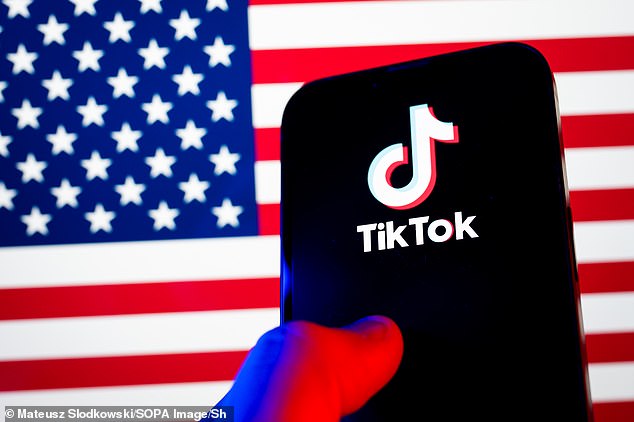
For TikTok’s parent company ByteDance Ltd, the stakes couldn’t be higher as it desperately fights the ban with an appeal to the US Supreme Court.
One intriguing possibility is that Musk’s company, X (formerly Twitter), takes control of TikTok’s US operations.
With more than 170 million users, TikTok would provide Musk’s platform with a huge user base and a wealth of data – and the perfect complement to his fast-growing AI venture, xAI.
Such a move could help X attract advertisers while strengthening Musk’s influence over social media, artificial intelligence and global trade.
Musk’s ties to the Trump administration add another layer of intrigue.
Musk has donated more than $250 million to Trump’s re-election campaign and is seen as a trusted ally by the new administration.
It is not clear how much ByteDance knows about the Chinese government talks and whether TikTok and Musk have been involved. It is also unclear whether Musk, TikTok and ByteDance have had discussions about the terms of a potential deal. Bloomberg reports.
Trump’s plan to delay the ban on TikTok until he takes office on January 20 suggests that Musk’s potential takeover could be a strategic negotiating point between Washington and Beijing.
Trump, who has 14.7 million followers on TikTok, has also called for the deadline to be postponed to give him time to negotiate a “political solution.”
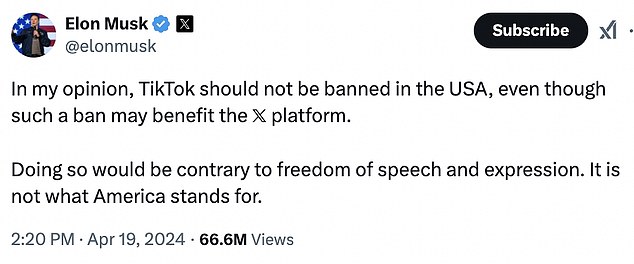
Despite his support for Trump, Musk has publicly opposed the TikTok ban
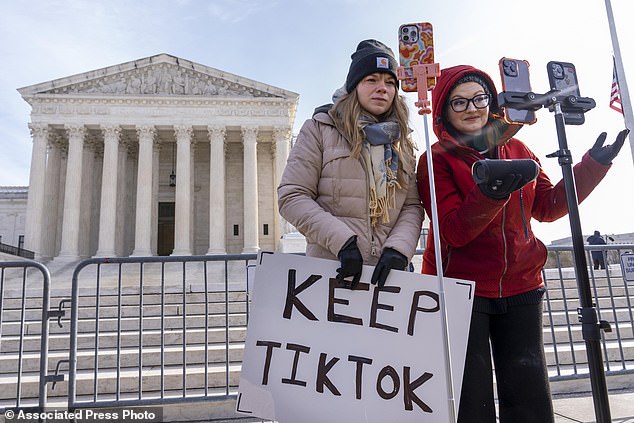
Sarah Baus and Tiffany Cianci, who say they are a “longtime creator of educational content,” livestreamed Friday on TikTok outside the Supreme Court in Washington by the Supreme Court
If the ban remains in place, the law passed by a bipartisan majority in Congress and signed by President Joe Biden in April will require TikTok to “go down” on January 19.
The judges are expected to act within days, almost certainly before Sunday’s deadline.
Content creators and small business owners who rely on the app are eagerly awaiting a decision.
Despite his support for Trump, Musk has publicly opposed the TikTok ban.
In April, he tweeted: “In my opinion, TikTok should not be banned in the US, even though such a ban could benefit the X platform. This would violate freedom of speech and expression. It’s not what America stands for.”
The Chinese government’s “golden stake” in a ByteDance subsidiary gives it significant influence over the fate of TikTok.
Export regulations, especially those related to software algorithms, further complicate any potential sale.
ByteDance’s algorithm, which powers TikTok’s recommendation engine, is a crown jewel that Beijing is unlikely to give up easily.
Government approval would be crucial for any deal, especially one involving a high-profile figure like Musk.
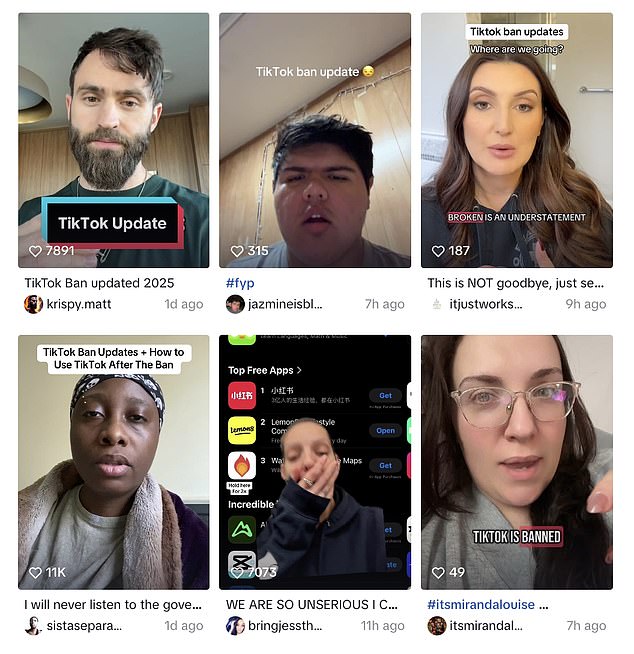
Content creators and small business owners who rely on the app are eagerly awaiting a decision on the ban
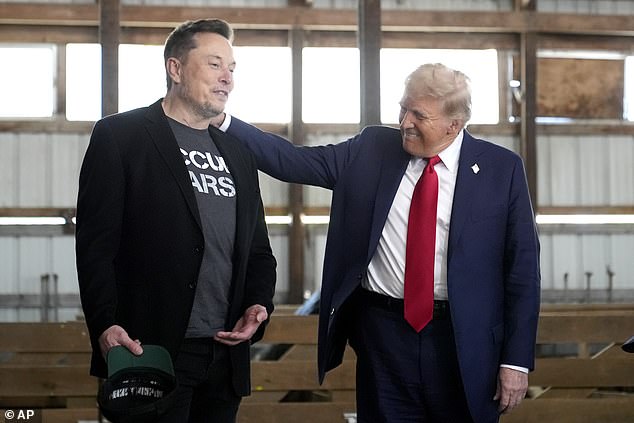
After donating more than $250 million to Trump’s re-election campaign, Musk is seen as a trusted ally by the new administration
TikTok’s American operations could generate as much as $40 to $50 billion, according to sources Bloomberg Intelligence analysts.
While Musk’s wealth is enormous reportedly worth $420 billion, such a deal would likely require significant financial maneuvering.
Complicating matters further, other high-profile bidders, including billionaire Frank McCourt and Shark Tank investor Kevin O’Leary, are reportedly pursuing TikTok through a venture called Project Liberty.
Microsoft and Oracle, previous contenders for TikTok’s U.S. operations, also remain in the mix.
Whether a competitive bidding process will follow or a government-mandated sale will be arranged remains uncertain.
Even if Musk emerges as the frontrunner, the logistical complexities of spinning off TikTok’s U.S. operations cannot be overstated.
Lawyers for TikTok have argued that such a move would be “extremely difficult” and would impact shareholders and operating structures on both sides of the Pacific.
Beijing’s willingness to entertain Musk’s involvement underlines its broader geopolitical stakes.
The TikTok negotiations could become a key bargaining chip as China braces for tough talks with the Trump administration over tariffs and export controls.
Given Musk’s history of working with Chinese officials through Tesla’s operations in Shanghai, he could see this as a pragmatic choice.
If TikTok isn’t sold to an approved buyer, federal law would ban app stores, such as Apple’s and Google’s, from offering the popular app. It would also ban internet hosting services from hosting TikTok.
TikTok users who already have the app on their phone will continue to have access to it.
But new users can’t download the app and existing users can no longer receive updates.
That will ultimately make the app unworkable, the Justice Department said in court filings.
US officials claim that the vast amounts of user data that TikTok collects, including sensitive information about viewing habits, could fall into the hands of the Chinese government through coercion.
They are also concerned that the proprietary algorithm that determines what users see on the app is vulnerable to manipulation by Chinese authorities, who could pressure ByteDance to shape the content on the platform in ways that are difficult to detect .
TikTok, which the government sued over the law last year, has long denied that it could be used as a tool of Beijing.
